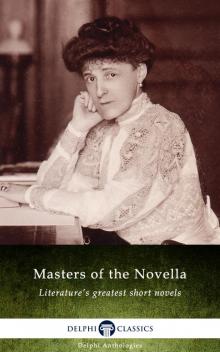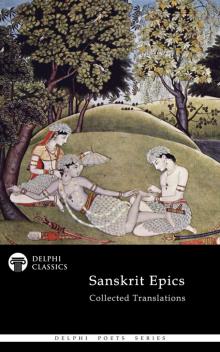- Home
- Delphi Classics
The Sanskrit Epics Page 2
The Sanskrit Epics Read online
Page 2
The wife of Ráma as his prey.
The son of Raghu32 came and found
Jaṭáyu slain upon the ground.
He rushed within his leafy cot;
He sought his wife, but found her not.
Then, then the hero’s senses failed;
In mad despair he wept and wailed.
Upon the pile that bird he laid,
And still in quest of Sítá strayed.
A hideous giant then he saw,
Kabandha named, a shape of awe.
The monstrous fiend he smote and slew,
And in the flame the body threw;
When straight from out the funeral flame
In lovely form Kabandha came,
And bade him seek in his distress
A wise and holy hermitess.
By counsel of this saintly dame
To Pampá’s pleasant flood he came,
And there the steadfast friendship won
Of Hanumán the Wind-God’s son.
Counselled by him he told his grief
To great Sugríva, Vánar chief,
Who, knowing all the tale, before
The sacred flame alliance swore.
Sugríva to his new-found friend
Told his own story to the end:
His hate of Báli for the wrong
And insult he had borne so long.
And Ráma lent a willing ear
And promised to allay his fear.
Sugríva warned him of the might
Of Báli, matchless in the fight,
And, credence for his tale to gain,
Showed the huge fiend33 by Báli slain.
The prostrate corse of mountain size
Seemed nothing in the hero’s eyes;
He lightly kicked it, as it lay,
And cast it twenty leagues34 away.
To prove his might his arrows through
Seven palms in line, uninjured, flew.
He cleft a mighty hill apart,
And down to hell he hurled his dart.
Then high Sugríva’s spirit rose,
Assured of conquest o’er his foes.
With his new champion by his side
To vast Kishkindhá’s cave he hied.
Then, summoned by his awful shout,
King Báli came in fury out,
First comforted his trembling wife,
Then sought Sugríva in the strife.
One shaft from Ráma’s deadly bow
The monarch in the dust laid low.
Then Ráma bade Sugríva reign
In place of royal Báli slain.
Then speedy envoys hurried forth
Eastward and westward, south and north,
Commanded by the grateful king
Tidings of Ráma’s spouse to bring.
Then by Sampáti’s counsel led,
Brave Hanumán, who mocked at dread,
Sprang at one wild tremendous leap
Two hundred leagues across the deep.
To Lanká’s35 town he urged his way,
Where Rávaṇ held his royal sway.
There pensive ‘neath Aśoka36 boughs
He found poor Sítá, Ráma’s spouse.
He gave the hapless girl a ring,
A token from her lord and king.
A pledge from her fair hand he bore;
Then battered down the garden door.
Five captains of the host he slew,
Seven sons of councillors o’erthrew;
Crushed youthful Aksha on the field,
Then to his captors chose to yield.
Soon from their bonds his limbs were free,
But honouring the high decree
Which Brahmá37 had pronounced of yore,
He calmly all their insults bore.
The town he burnt with hostile flame,
And spoke again with Ráma’s dame,
Then swiftly back to Ráma flew
With tidings of the interview.
Then with Sugríva for his guide,
Came Ráma to the ocean side.
He smote the sea with shafts as bright
As sunbeams in their summer height,
And quick appeared the Rivers’ King38
Obedient to the summoning.
A bridge was thrown by Nala o’er
The narrow sea from shore to shore.39
They crossed to Lanká’s golden town,
Where Ráma’s hand smote Rávaṇ down.
Vibhishaṇ there was left to reign
Over his brother’s wide domain.
To meet her husband Sítá came;
But Ráma, stung with ire and shame,
With bitter words his wife addressed
Before the crowd that round her pressed.
But Sítá, touched with noble ire,
Gave her fair body to the fire.
Then straight the God of Wind appeared,
And words from heaven her honour cleared.
And Ráma clasped his wife again,
Uninjured, pure from spot and stain,
Obedient to the Lord of Fire
And the high mandate of his sire.
Led by the Lord who rules the sky,
The Gods and heavenly saints drew nigh,
And honoured him with worthy meed,
Rejoicing in each glorious deed.
His task achieved, his foe removed,
He triumphed, by the Gods approved.
By grace of Heaven he raised to life
The chieftains slain in mortal strife;
Then in the magic chariot through
The clouds to Nandigráma flew.
Met by his faithful brothers there,
He loosed his votive coil of hair:
Thence fair Ayodhyá’s town he gained,
And o’er his father’s kingdom reigned.
Disease or famine ne’er oppressed
His happy people, richly blest
With all the joys of ample wealth,
Of sweet content and perfect health.
No widow mourned her well-loved mate,
No sire his son’s untimely fate.
They feared not storm or robber’s hand;
No fire or flood laid waste the land:
The Golden Age40 had come again
To bless the days of Ráma’s reign.
From him, the great and glorious king,
Shall many a princely scion spring.
And he shall rule, beloved by men,
Ten thousand years and hundreds ten,41
And when his life on earth is past
To Brahmá’s world shall go at last.”
Whoe’er this noble poem reads
That tells the tale of Ráma’s deeds,
Good as the Scriptures, he shall be
From every sin and blemish free.
Whoever reads the saving strain,
With all his kin the heavens shall gain.
Bráhmans who read shall gather hence
The highest praise for eloquence.
The warrior, o’er the land shall reign,
The merchant, luck in trade obtain;
And Śúdras listening42 ne’er shall fail
To reap advantage from the tale.43
Canto II. Brahmá’s Visit
VÁLMÍKI, GRACEFUL SPEAKER, heard,
To highest admiration stirred.
To him whose fame the tale rehearsed
He paid his mental worship first;
Then with his pupil humbly bent
Before the saint most eloquent.
Thus honoured and dismissed the seer
Departed to his heavenly sphere.
Then from his cot Válmíki hied
To Tamasá’s44 sequestered side,
Not far remote from Gangá’s tide.
He stood and saw the ripples roll
Pellucid o’er a pebbly shoal.
To Bharadvája45 by his side
He turned in ecstasy, and cried:
“See,
pupil dear, this lovely sight,
The smooth-floored shallow, pure and bright,
With not a speck or shade to mar,
And clear as good men’s bosoms are.
Here on the brink thy pitcher lay,
And bring my zone of bark, I pray.
Here will I bathe: the rill has not,
To lave the limbs, a fairer spot.
Do quickly as I bid, nor waste
The precious time; away, and haste.”
Obedient to his master’s hest
Quick from the cot he brought the vest;
The hermit took it from his hand,
And tightened round his waist the band;
Then duly dipped and bathed him there,
And muttered low his secret prayer.
To spirits and to Gods he made
Libation of the stream, and strayed
Viewing the forest deep and wide
That spread its shade on every side.
Close by the bank he saw a pair
Of curlews sporting fearless there.
But suddenly with evil mind
An outcast fowler stole behind,
And, with an aim too sure and true,
The male bird near the hermit slew.
The wretched hen in wild despair
With fluttering pinions beat the air,
And shrieked a long and bitter cry
When low on earth she saw him lie,
Her loved companion, quivering, dead,
His dear wings with his lifeblood red;
And for her golden crested mate
She mourned, and was disconsolate.
The hermit saw the slaughtered bird,
And all his heart with ruth was stirred.
The fowler’s impious deed distressed
His gentle sympathetic breast,
And while the curlew’s sad cries rang
Within his ears, the hermit sang:
“No fame be thine for endless time,
Because, base outcast, of thy crime,
Whose cruel hand was fain to slay
One of this gentle pair at play!”
E’en as he spoke his bosom wrought
And laboured with the wondering thought
What was the speech his ready tongue
Had uttered when his heart was wrung.
He pondered long upon the speech,
Recalled the words and measured each,
And thus exclaimed the saintly guide
To Bharadvája by his side:
“With equal lines of even feet,
With rhythm and time and tone complete,
The measured form of words I spoke
In shock of grief be termed a śloke.”46
And Bharadvája, nothing slow
His faithful love and zeal to show,
Answered those words of wisdom, “Be
The name, my lord, as pleases thee.”
As rules prescribe the hermit took
Some lustral water from the brook.
But still on this his constant thought
Kept brooding, as his home he sought;
While Bharadvája paced behind,
A pupil sage of lowly mind,
And in his hand a pitcher bore
With pure fresh water brimming o’er.
Soon as they reached their calm retreat
The holy hermit took his seat;
His mind from worldly cares recalled,
And mused in deepest thought enthralled.
Then glorious Brahmá,47 Lord Most High,
Creator of the earth and sky,
The four-faced God, to meet the sage
Came to Válmíki’s hermitage.
Soon as the mighty God he saw,
Up sprang the saint in wondering awe.
Mute, with clasped hands, his head he bent,
And stood before him reverent.
His honoured guest he greeted well,
Who bade him of his welfare tell;
Gave water for his blessed feet,
Brought offerings,48 and prepared a seat.
In honoured place the God Most High
Sate down, and bade the saint sit nigh.
There sate before Válmíki’s eyes
The Father of the earth and skies;
But still the hermit’s thoughts were bent
On one thing only, all intent
On that poor curlew’s mournful fate
Lamenting for her slaughtered mate;
And still his lips, in absent mood,
The verse that told his grief, renewed:
“Woe to the fowler’s impious hand
That did the deed that folly planned;
That could to needless death devote
The curlew of the tuneful throat!”
The heavenly Father smiled in glee,
And said, “O best of hermits, see,
A verse, unconscious, thou hast made;
No longer be the task delayed.
Seek not to trace, with labour vain,
The unpremeditated strain.
The tuneful lines thy lips rehearsed
Spontaneous from thy bosom burst.
Then come, O best of seers, relate
The life of Ráma good and great,
The tale that saintly Nárad told,
In all its glorious length unfold.
Of all the deeds his arm has done
Upon this earth, omit not one,
And thus the noble life record
Of that wise, brave, and virtuous lord.
His every act to day displayed,
His secret life to none betrayed:
How Lakshmaṇ, how the giants fought;
With high emprise and hidden thought:
And all that Janak’s child49 befell
Where all could see, where none could tell.
The whole of this shall truly be
Made known, O best of saints, to thee.
In all thy poem, through my grace,
No word of falsehood shall have place.
Begin the story, and rehearse
The tale divine in charming verse.
As long as in this firm-set land
The streams shall flow, the mountains stand,
So long throughout the world, be sure,
The great Rámáyan shall endure.50
While the Rámáyan’s ancient strain
Shall glorious in the earth remain,
To higher spheres shalt thou arise
And dwell with me above the skies.”
He spoke, and vanished into air,
And left Válmíki wondering there.
The pupils of the holy man,
Moved by their love of him, began
To chant that verse, and ever more
They marvelled as they sang it o’er:
“Behold, the four-lined balanced rime,
Repeated over many a time,
In words that from the hermit broke
In shock of grief, becomes a śloke.”
This measure now Válmíki chose
Wherein his story to compose.
In hundreds of such verses, sweet
With equal lines and even feet,
The saintly poet, lofty-souled,
The glorious deeds of Ráma told.
Canto III. The Argument.
THE HERMIT THUS with watchful heed
Received the poem’s pregnant seed,
And looked with eager thought around
If fuller knowledge might be found.
His lips with water first bedewed,51
He sate, in reverent attitude
On holy grass,52 the points all bent
Together toward the orient;53
And thus in meditation he
Entered the path of poesy.
Then clearly, through his virtue’s might,
All lay discovered to his sight,
Whate’er befell, through all their life,
Ráma, his brother, and his wife:
At every time, in every scene:
His people too, of every sort;
The nobles of his princely court:
Whate’er was said, whate’er decreed,
Each time they sate each plan and deed:
For holy thought and fervent rite
Had so refined his keener sight
That by his sanctity his view
The present, past, and future knew,
And he with mental eye could grasp,
Like fruit within his fingers clasp,
The life of Ráma, great and good,
Roaming with Sítá in the wood.
He told, with secret-piercing eyes,
The tale of Ráma’s high emprise,
Each listening ear that shall entice,
A sea of pearls of highest price.
Thus good Válmíki, sage divine,
Rehearsed the tale of Raghu’s line,
As Nárad, heavenly saint, before
Had traced the story’s outline o’er.
He sang of Ráma’s princely birth,
His kindness and heroic worth;
His love for all, his patient youth,
His gentleness and constant truth,
And many a tale and legend old
By holy Viśvámitra told.
How Janak’s child he wooed and won,
And broke the bow that bent to none.
How he with every virtue fraught
His namesake Ráma54 met and fought.
The choice of Ráma for the throne;
The malice by Kaikeyí shown,
Whose evil counsel marred the plan
And drove him forth a banisht man.
How the king grieved and groaned, and cried,
And swooned away and pining died.
The subjects’ woe when thus bereft;
And how the following crowds he left:
With Guha talked, and firmly stern
Ordered his driver to return.
How Gangá’s farther shore he gained;
By Bharadvája entertained,
By whose advice he journeyed still
And came to Chitrakúṭa’s hill.
How there he dwelt and built a cot;
How Bharat journeyed to the spot;
His earnest supplication made;
Drink-offerings to their father paid;
The sandals given by Ráma’s hand,
As emblems of his right, to stand:
How from his presence Bharat went
And years in Nandigráma spent.
How Ráma entered Daṇḍak wood
And in Sutíkhṇa’s presence stood.
The favour Anasúyá showed,
The wondrous balsam she bestowed.
How Śarabhanga’s dwelling-place
They sought; saw Indra face to face;
The meeting with Agastya gained;
The heavenly bow from him obtained.
How Ráma with Virádha met;

 Masters of the Theatre
Masters of the Theatre Masters of the Novella
Masters of the Novella The Sanskrit Epics
The Sanskrit Epics